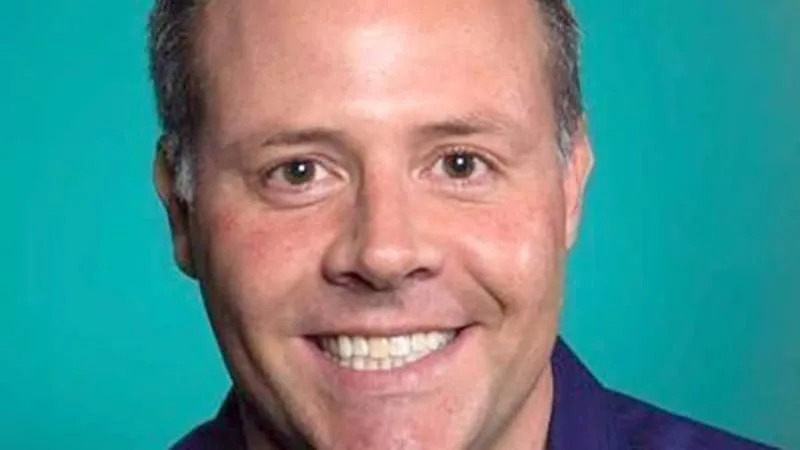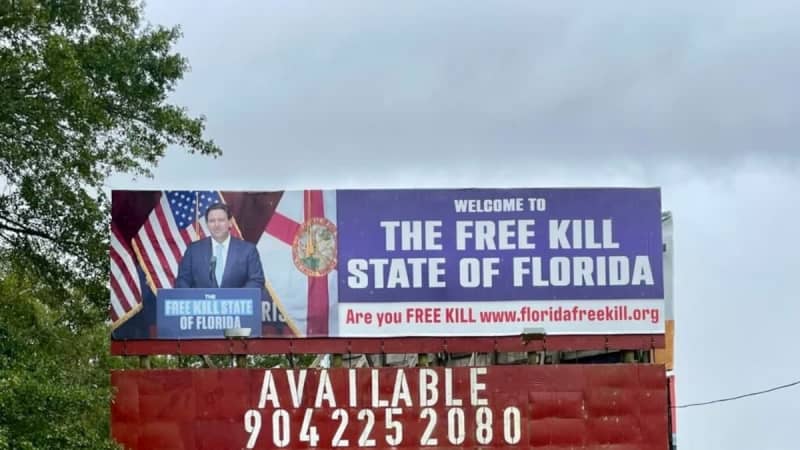The new billboard along Interstate 95, just south of the Florida-Georgia line, delivers a stark message to motorists who think they’re entering a state where things are always sunny. It says: “WELCOME TO THE FREE KILL STATE OF FLORIDA.”

The words, printed next to a picture of the state’s governor, certainly deliver a jolt.
But it’s nothing compared to the shock sustained by the grieving father who paid for the sign. First, Daryl Perritt’s 33-year-old son died in the hospital. Then Perritt said he couldn’t even find out why, thanks to a bizarre law, unique to Florida, meant to protect negligent health care providers.
The law essentially says that, even if a provider negligently kills an adult patient, family members cannot sue for pain, suffering and answers — unless the dead patient has a spouse or minor children.
So if you have a 25-year-old daughter who has yet to marry or have children, you can’t sue. The same goes for your mother and father if their spouse has already passed away.
It also applied to Perritt’s son, Cameron — a gregarious 33-year-old who loved to make people laugh and smoke ribs in the family’s popular St. Augustine smokehouse.
According to Perritt, Cameron had a history of blood clots and was admitted to the hospital last fall coughing up black blood and yet didn’t get surgery until three days later, when the hospital staff told him they probably couldn’t save him.
Perritt was heartbroken. But he also wanted answers. And justice. And his grief turned to outrage when he learned that he couldn’t.
“If it happened in Georgia, this would have been different,” Perritt said. “If it happened when he was 24 or if he had a wife or children, all of this would be different. It put me in a very dark place.”
Lawmakers from both parties agree this law should be repealed. In fact, in a rare display of bipartisan agreement, both chambers voted overwhelmingly last year to repeal this ugly protection for negligent health care providers.
But said Gov. Ron DeSantis — after hearing and taking campaign contributions from the business, medical and insurance lobbies — vetoed the measure.
DeSantis described families who sue doctors as seeking “jackpot justice” — a phrase that infuriates Perritt, since he never wanted to become a member of the grim fraternity of fathers who bury their kids.
“I don’t need money. I got plenty of money,” he said. “What I need are answers.”
See, that’s one of the things that people who casually demonize litigation forget. Sometimes, lawsuits are the only way families can get answers.
In Perritt’s case, he said he believed his son needed surgery immediately — and that family members tried to stress the urgency the moment Cameron was admitted — but that the hospital delayed until it was too late.
Maybe Perritt is wrong. Maybe the hospital did everything by the book. But by denying the family the chance to sue, it cannot force the kind of disclosure that litigation often reveals. “We’ve been ghosted,” Perritt said. “What this law does is hide those answers.”
That’s how Florida’s business lobby wants it. Back in 1990, the medical and insurance lobby convinced the Legislature, which was run by Democrats at the time, to insert a carve-out in the state’s Wrongful Death Act that essentially sets different values on the lives of different humans.
If your 24-year-old son dies on the operating table during a routine procedure, you can sue for pain, suffering and answers. But if your 26-year-old son dies — and isn’t married and doesn’t have kids — you can’t.
The carve-out disproportionately affects widows, widowers and special-needs adults who are less likely to marry or have children, devaluing their lives in a way that critics say makes them “free kills.”
Even though lawmakers from both parties say the law should be repealed, the state’s business interests have run an intense — and threatening — lobbying campaign to keep it in place.
In 2021, the Florida Chamber of Commerce warned lawmakers that any vote to repeal the measure would be double-weighted against them in the chamber’s annual “How they Voted” report card that helps business interests decide which politicians are worthy of campaign contributions.
The medical and insurance lobby says the free-kill provision is needed to address sky-high insurance costs in Florida and a shortage of doctors, as well as to combat families eager for big payouts.
The last part of that argument is pretty callous. Most people would rather still have their parents or children than a verdict. But the other parts of their argument also crumble under serious thought and examination.
First of all, no family gets paid unless a jury determines that negligence occurred or a health care provider decides to make a settlement to avoid the jury even getting that chance.
Second, the “free kill” carve out obviously did not address the insurance rates and doctor-shortage issues, because it has been in place for 35 years, and those issues still exist.
Many doctors agree, saying the “free kill” provision is just a red-herring. That includes Dr. Joel Rudman, a physician and former GOP legislator who told lawmakers last year: “Doctors aren’t going to leave Florida because of this bill — no good doctor. If a bad doctor wants to leave, bye.”
Lawmakers are trying again. Newly filed House Bill 6003 has both Republican and Democratic sponsors, including local Democratic representatives Johanna Lopez and Anna Eskamani.
I’m impressed lawmakers are trying again. I would’ve been more impressed if Republican leaders had summoned the courage to override the governor’s veto last year when they clearly had the numbers to do so.
But this year’s bill is again getting early bipartisan support. Perritt and other families will be watching — and erecting more billboards, if needed, asking Floridians to learn more about their cause at www.floridafreekill.org.
This is a fight Perritt never wanted to wage, but one he refuses to surrender. “Why should a politician decide the value of my son’s life?” he asked. “It’s an absurd concept — a manipulation of the system. This is supposed to be the land of justice for all. Just treat everyone equally.”
©2025 Orlando Sentinel

اترك تعليقاً